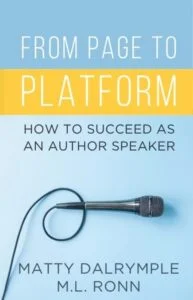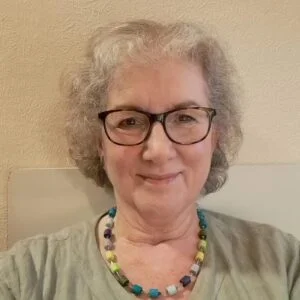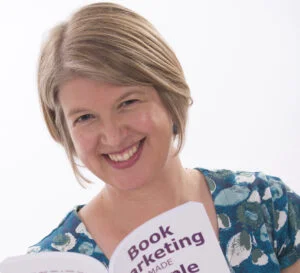
Debbie Young speaking at Ness Book Fest 2018
Speaking engagements offer a powerful avenue for indie authors to generate income, expand their reach, and build their brands. While the speaking circuit can be daunting initially, it has proven to be highly lucrative for some. Authors like Mel Robbins and Tony Robbins, who command six-figure fees for their appearances, are prime examples of how successful speaking as an income stream can be.
For many writers, the prospect of making substantial earnings through speaking gigs might seem distant, yet with the right strategies, even those new to the scene can carve out a profitable niche. On today's advice post from the Alliance of Independent Authors, we'll look more closely at this potential income stream.
Traditionally, speaking engagements within writing circuits have been notoriously underpaid. Authors are often asked to speak for free, under the guise of gaining “exposure,” but this devalues their time and expertise. The landscape is slowly changing as more authors recognize the value they bring to the table and start demanding fair compensation. Whether you're a fiction writer, a nonfiction author, or a poet, there are opportunities to turn speaking into a viable income stream.
For poets, spoken word events are a natural fit. These can include poetry readings, slam poetry competitions, and performances at literary festivals. Spoken word events not only provide a platform for poets to showcase their work but also offer opportunities to connect with audiences on a deeper level. By leveraging these events, poets can sell books, gain followers, and even secure paid gigs as featured performers.
Nonfiction authors, on the other hand, have a broad spectrum of speaking opportunities available to them. Corporate events, educational seminars, motivational speaking, and industry conferences are just a few examples. These engagements allow nonfiction writers to share their expertise and insights, whether it's in business, health, self-improvement, or any other field. Teaching workshops and conducting webinars are additional avenues where nonfiction authors can monetize their knowledge and build their reputation as thought leaders.
Fiction authors might find the speaking circuit less straightforward, but there are still valuable opportunities to explore. Reader panels at literary festivals and book fairs are common platforms where fiction writers can engage with their audience. Author readings and book signings provide intimate settings for connecting with fans and selling books. Furthermore, fiction writers can also participate in discussions about writing techniques, storytelling, and the creative process, which can attract budding writers and avid readers alike.
Overall, the potential to earn a substantial income from speaking engagements is real and attainable. By understanding the specific opportunities available for their genre, authors can strategically approach the speaking circuit and maximize their earning potential. Whether you're a poet captivating audiences with your spoken word, a nonfiction author enlightening a corporate audience, or a fiction writer enchanting readers at a literary festival, speaking engagements can significantly enhance your career and income as an author.
Types of Speaking Engagements

ALLi Campaigns Manager Matty Dalrymple and author M.L. Ronn just finished a book called From Page to Platform: How to Succeed as an Author Speaker, which will launch on August 30. They identified the types of speaking engagements that can result in income for authors.
Workshops
Workshops are in-depth, interactive sessions focused on a specific topic, often lasting several hours or even days. These events can involve presentations, group activities, and hands-on exercises, with the goal of providing practical skills and knowledge. Workshops are typically facilitated by one or more experts who guide participants through the material, ensuring a rich and engaging learning experience.
Workshops offer higher fees compared to other types of speaking engagements due to their intensive nature and the significant preparation involved. Organizers recognize the value and effort required to develop and conduct a workshop, allowing speakers to command higher compensation. Moreover, workshops provide an excellent opportunity to build strong bonds with participants. These events are highly interactive, fostering a deeper connection between the speaker and the audience. Participants are likely to become life-long fans and followers, contributing to the speaker's long-term success.
Author Readings
Author readings are events where authors read excerpts from their books to an audience. These readings are often followed by discussions or Q&A sessions, providing an intimate setting for authors to engage with readers. These events are an excellent opportunity to showcase one's work and connect with an audience on a personal level.
Author readings can be a direct source of income through the sale of books. Authors have the opportunity to sell their books to attendees, either in print or electronic formats. These events can significantly boost book sales, especially when the audience is highly engaged and interested in the author's work. Additionally, author readings help build a community with readers and fellow authors. They offer a personal touch, allowing readers to connect with the author on a deeper level. Successful readings can also lead to more speaking gigs and invitations to similar events, expanding the author's reach and influence.
Keynotes
Keynote speeches are formal presentations aimed at inspiring and motivating the audience. They are typically delivered at the beginning or end of an event and are characterized by their scripted nature and formal delivery. Keynote speakers are often seen as leading authorities in their field, and the honorarium reflects the importance of their role in the event.
Keynotes have high earning potential due to their prestigious and formal nature. Delivering a keynote speech establishes the speaker as a prominent figure and thought leader. It can lead to more invitations for high-paying engagements and elevate the speaker's profile within their industry. Preparing for a keynote speech involves substantial preparation, including the development of visual aids and a polished script, which enhances the overall quality and impact of the presentation.
Panels
Panels involve group discussions where multiple experts share their insights on a specific topic. These discussions are usually moderated, allowing for a structured conversation among the panelists. While panels generally offer lower fees than keynotes and workshops, they can still provide direct income. The compensation for panel participation is typically modest, reflecting the reduced preparation required compared to solo presentations.
Panels offer significant opportunities for indirect income through book sales and networking. Participating in panels allows authors to showcase their expertise and connect with other industry professionals. These connections can lead to future speaking opportunities and collaborations. Additionally, panels help authors reach new audiences who may become interested in their books and other offerings.
Selling Books at Speaking Engagements
Any speaking engagement where the author can sell their books to attendees can be a significant source of direct income. This includes workshops, author readings, keynotes, and panels. Authors can capitalize on the interest generated by their presentations to sell books on-site or direct attendees to purchase them online.
Speaking engagements that include book sales not only boost income but also enhance the author's reputation. A compelling talk can entice the audience to purchase the author's books, ensuring that they leave with a tangible connection to the speaker's work. This strategy reinforces the author's message and helps to build a loyal reader base. Selling books at these events provides an additional revenue stream while simultaneously promoting the author's brand and work.
These types of engagements offer both direct and indirect income opportunities, making them valuable components of an author's speaking career.
We asked a few ALLi members who have had practical experience with earning an income as a speaker, and here’s some of their advice.
Author Debbie Young

Debbie Young
Author Debbie Young, known for her cozy mysteries, offers insightful tips on how authors can make speaking engagements a viable income stream. Debbie emphasizes the efficiency of having a standard talk that can be repeated for different audiences. In the UK, for instance, there are numerous writers' groups within a reasonable driving distance, allowing authors to deliver the same talk multiple times, thereby maximizing the effort put into creating it. She advises, “It will help you to have a standard talk to roll out to different audiences rather than have to write a fresh one each time.”
When pricing a new talk, Debbie advises authors to consider not just the presentation time, but also the significant time investment required for writing the talk, creating PowerPoint slides or handouts, handling administrative tasks, arranging travel, and liaising with hosts. The Society of Authors in the UK recommends a minimum charge of £150 per hour, which, when factoring in all the preparation and follow-up work, is a fair rate. Debbie notes, “That sounds like a high hourly rate—until you factor in all the preparation, follow-up, and recovery time.”
Debbie warns that while talks can be a distraction from writing and can be mentally, physically, and emotionally exhausting, they also offer numerous benefits. They can be enjoyable and stimulating, introduce authors to new readers who might become superfans, and provide a sense of fame. She says, “They can be great fun, very stimulating, introduce you to potential new readers who may then go on to become superfans, and make you feel famous!”
She encourages authors to think creatively about their talk topics. A simple “person writes book” story is not compelling, but sharing the inspiration and background behind a book, describing the writing process, and performing animated readings can make for an engaging and memorable presentation. Tailoring the talk to the audience, whether they are writers or readers, is also crucial. Debbie advises, “Remember, ‘person writes book' is not a story – but a detailed account of the inspiration and background to your book, and an account of your writing process, and animated readings from your work, all contribute to an interesting, personal, memorable talk.”
Leaving 10-20% of the allotted time for a Q&A session is another key tip from Debbie. This personal engagement can make the audience feel special and more connected to the author.
Debbie also highlights the importance of understanding the promotion responsibilities of the event organizer. If the organizer expects the author to generate the audience, this should be factored into the planning and stress levels. “When you commit to a talk, be clear how much promotion the organizer will do. If they're expecting you to bring your camp followers and generate an audience, factor that into your time – and stress levels,” she says.
She notes that small local literary festivals are often more receptive to pitches from authors than larger ones, which typically rely on household names to attract audiences.
Debbie also supports giving talks for free in certain situations, such as fundraisers for charities or causes the author supports, or if it helps to raise the author’s profile. She quotes Nicola Solomon, former CEO of the Society of Authors, who advised, “Follow the three Ps. Only do things if they bring you pleasure, profit, or publicity.” An event need not fulfill all three to be worthwhile.
Finally, Debbie suggests adapting the same talk for different purposes. She has a standard one-hour talk called “So You Think You've Got a Book in You?” which she has also adapted into a two-hour workshop for a different audience.
These practical insights from Debbie Young can help authors effectively leverage speaking engagements as an additional income stream.
Book Mentor Karen Williams

Karen Williams
Karen Williams, a book mentor with expertise in the non-fiction business arena, offers valuable advice for authors considering speaking engagements as a way to promote their work and generate income. Karen emphasizes the importance of clarifying with the event organizer whether you can actively promote your book or work, especially for non-paid events. She advises, “It's useful to agree with an organiser in advance whether you can actively promote your book/your work. This is especially important if this is a non-paid event.” Additionally, she suggests ensuring that the organizer covers at least the fuel or travel expenses for non-paid events.
For in-person events, Karen recommends considering book signings. She notes that if there are large numbers of attendees, shipping books directly to the venue, possibly through services like IngramSpark, can be practical. “Some of my clients have also included their books in the speaker fee, which adds value to the attendees,” she adds.
Having adapted to the rise of online talks over the past few years, Karen points out the different dynamics involved. She advises having a method for attendees to order books, such as providing a link or QR code on the background behind you during the talk.
Karen also highlights the potential of podcasts as a complementary platform to traditional speaking events. “Consider podcasts alongside traditional speaking events as they are great ways to get in front of other audiences,” she suggests. Karen has even created her own podcast, “Business Book Bites,” where she brings in speakers, thereby creating her own platform to reach a wider audience.
These insights from Karen Williams provide authors with practical strategies to use speaking engagements and podcasts effectively to promote their books and expand their reach.
Author Margaret Skea

Margaret Skea
Author Margaret Skea, who has successfully leveraged speaking engagements to supplement her income as a fiction writer, shares her strategies for authors looking to do the same. Margaret advises starting with small-scale events to build a reputation and gradually progressing to larger organizations. “In the UK, that might be beginning with groups such as the Women's Rural Institute and local libraries and moving up the range through Rotary Clubs, Probus, literary societies, historical societies, etc. as appropriate,” she explains.
Scaling the speaking fee according to the size of the audience and the author's level of experience is another key point. She emphasizes the importance of stating that books will be available for sale and signing at the event. “Always state you will have books to sell/sign,” Margaret advises.
Understanding the likely audience demographics, such as gender and age range, is crucial for tailoring the presentation. Margaret recommends adjusting the tone and detail level of the talk to match the audience's preferences, whether it needs to be humorous or serious, short or detailed.
At the end of the event, Margaret highlights the importance of engaging with attendees individually, even if there's a queue for book signing. She also suggests thinking of polite ways to move people along if they tend to monopolize your time. “Remember to mention your email list and have a sign-up sheet,” she says, pointing out that this can help maintain connections with the audience. She also stresses the importance of wearing comfortable clothes that reflect your personality.
Margaret advises not to be disheartened if there isn't a queue for book signing, noting that this happens to everyone. “How you have presented yourself may lead to sales later, whether it's through Kindle or KU reads,” she encourages.
Finally, Margaret suggests considering a print run rather than print-on-demand (POD) if building up a calendar of speaking events. This can maximize profits from book sales at events. “I sell a lot of print books at events, and as I do a print run, I get a much better profit margin than I would if I was using POD,” she notes.
These insights from Margaret Skea provide a practical guide for authors to enhance their income through speaking engagements, ensuring both immediate and long-term benefits.
Author Daniel Parsons

Daniel Parsons
Daniel Parsons provides a comprehensive guide on how authors can monetize their speaking gigs, offering practical advice for turning speaking engagements into a lucrative income stream. He begins by addressing common concerns that new authors may have, such as self-doubt and the belief that their time isn’t valuable. “Starting can be daunting,” he acknowledges, but reassures authors that these feelings are common and surmountable.
One of Parsons' key recommendations is to establish and normalize a speaking fee. He advises authors to start with a higher fee than they think they deserve and to base it on the value provided and audience size rather than the time spent onstage. “Many low-profile speakers charge between $300 and $1,000 for a single-day event,” he notes, highlighting that even higher fees are typical for experienced speakers.
Don't forget you can sell your own work at your events
Parsons also emphasizes the importance of selling books at events, suggesting that authors bring an inventory of their books to sell after their talks. He advises, “Simply provide value when speaking and mention casually at the end that you have books available for anyone who’s interested.” This strategy allows authors to engage their audience and boost book sales without feeling like they are aggressively pitching their work.
In addition to book sales, Parsons recommends hosting book signings after speaking engagements. This provides an opportunity to have one-on-one conversations with readers, answer their questions, and possibly secure future speaking engagements. “Inform them when onstage that you’ll be happy to speak further at your signing table after your talk,” he suggests, which can help in building rapport and generating more sales.
Finally, Parsons highlights the value of collecting email addresses at events. He points out that an email list is a powerful marketing tool and building one at speaking engagements can lead to highly engaged subscribers. “Playing the long game can lead to you selling far more books,” he asserts, sharing how connections made at events can turn into substantial book sales or additional speaking opportunities over time.
By following these strategies, authors can not only enhance their immediate earnings from speaking gigs but also build a sustainable and profitable platform for their long-term career.
Conclusion
The journey to monetizing speaking engagements as a self-published or indie author requires effort, strategic planning, and perseverance. By understanding the various types of speaking engagements and learning from the experiences of successful authors like Debbie Young, Karen Williams, Margaret Skea, and Daniel Parsons, authors can develop a solid approach to building this income stream.
Whether it's through workshops, author readings, keynotes, or panels, each type of engagement offers unique opportunities to connect with audiences, sell books, and establish oneself as a thought leader in the industry. By implementing these strategies, authors can significantly enhance their career and income through speaking engagements.
Want to join the conversation or find out more?
 If you’re an ALLi member, head over to the SelfPubConnect forum for support from our experienced community of indie authors, advisors, and our own ALLi team, or share your own experience with the community.
If you’re an ALLi member, head over to the SelfPubConnect forum for support from our experienced community of indie authors, advisors, and our own ALLi team, or share your own experience with the community.
To access the forum, simply create an account (if you haven’t already) to request to join the forum and get going.
Non-members looking for more information can search our extensive archive of blog posts and podcast episodes packed with tips and advice at ALLi's Self-Publishing Advice Centre.





I give history talks based on my n-f books several times a year, mostly at local libraries. I usually say that my fee is the group’s standard fee for speakers. After reading this post, I would now give a specific amount first, and knowing that some libraries are struggling, add or whatever you can afford. Good article with useful information, although I thought the examples of top paying author/speakers set the bar too high. Any other mid-range examples?